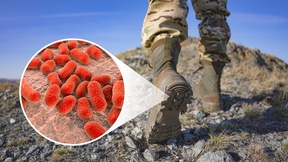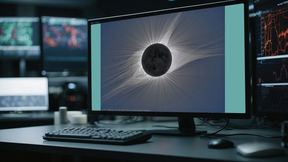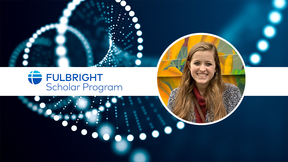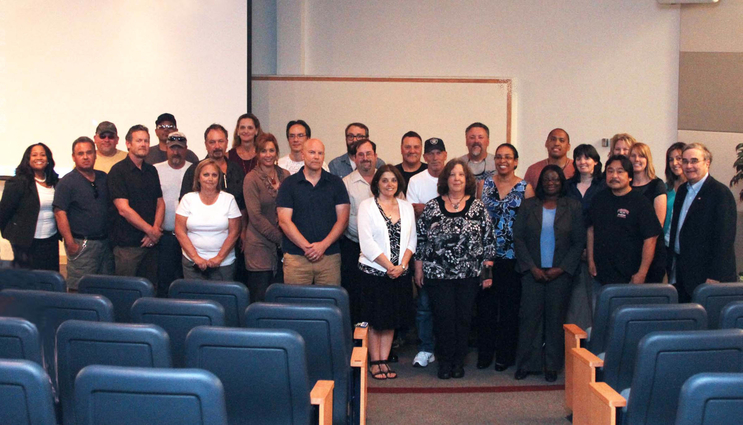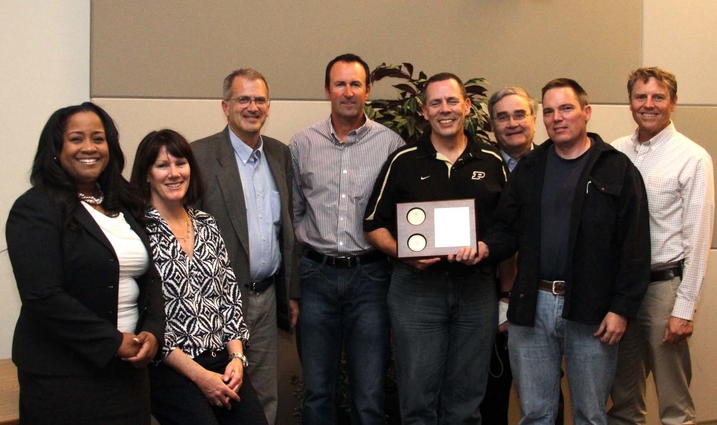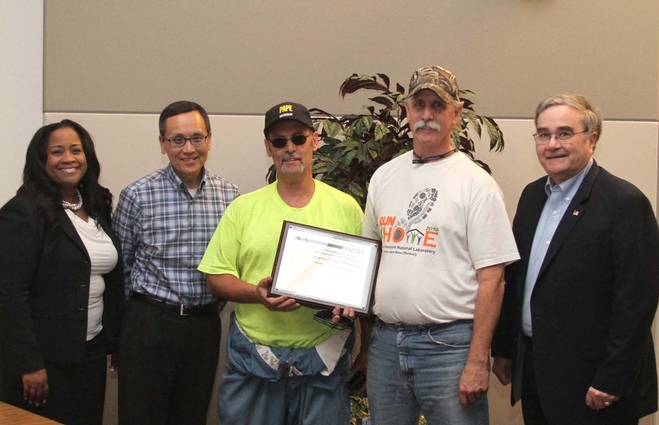Sustainability efforts recognized during ceremony
Last week, three teams of Lawrence Livermore employees were recognized for their efforts in implementing sustainability projects at the Laboratory. These projects received 2013 Sustainability Awards from the National Nuclear Security Administration (NNSA).
The awards recognize exemplary individual and team performance in advancing sustainability objectives through innovative and effective programs and projects that increase energy, water and fleet efficiency and reduce greenhouse gases, pollution and waste. NNSA has conducted an internal environmental stewardship awards program for more than a decade.
The following Lab efforts were recognized:
Waste reduction and pollution prevention at NIF (Best in Class Award)
The National Ignition Facility and Photon Science (NIF & PS) Directorate has implemented numerous program improvements that have significantly reduced low-level radiological waste generation, product use and costs and time spent managing hazards. When NIF, the world's largest and highest energy laser system, introduced radioactive fuel (tritium) to the facility in September 2010, hazard management protocols were on high alert given the untested operations. As the program progressed, NIF collected data from more than 10,000 surveys to verify the effectiveness of engineering controls and also ensured the workforce was properly trained to manage hazards.
With a better understanding of radiological risks and refinement of employee's skills, NIF was able to identify and implement several program adjustments to right-size safety protocols with actual hazards to improve overall operational efficiency. This 'active risk management' approach resulted in a reduction of an estimated 12,240 cubic feet of radiological waste per year, $1.3 million in consumables and 40,000 person-hours per year of time spent managing NIF hazards.
Participants include: Richard Beale, Jon Dillon, Kenneth Kasper, Terry Land, Tom Kohut, Steve Moyle, Rick Thacker and Phil Worley.
Holistic waste reduction program (Best in Class Award)
LLNL has a well-established recycling program for office paper, cardboard, toner, cans and bottles, scrap metal, wood, tires, greenwaste, compostable materials and other municipal waste. More than 68 percent of the Lab's municipal waste is consistently diverted from the landfill through these efforts. LLNL continually looks for ways to build on this success, and in FY12 concentrated on developing a holistic cross-disciplinary program to expand reuse and recycling opportunities and benefits across the site.
Connecting at many levels throughout the Lab was the key to melding the program into a diverse campus-wide system. With the Sustainability Performance Program (SP2) at the hub, ties were made with individuals representing internal programs as well as committees directing related Lab initiatives. To enhance the program further, connections went beyond LLNL's boundaries to tap into local and regional entities, and the greater DOE complex. All of these links made it possible to expand the types of items recycled, and promote a culture that considers reuse first.
To evaluate the effectiveness of this approach, a database was established to track reuse transactions and special recycling projects. To date, an estimated $524,000 has been saved through reuse activities, and more than 30,000 pounds of items for which a recycling pathway was not previously available were recycled. The reuse and cost savings data also provided valuable evidence to support development of an internal 'Craigslist' application to facilitate reuse exchanges site-wide and better manage reuse of property.
Participants include: Mitch Alvarez, Dione Ancheta, Leonette Bogart, Sabre Coleman, Lisa Crawford, Ignacio Delgado, Jennifer Doman, Kimberly Dremalas, Shelane French, Ed Harland, Greg S. Lee, Loren Lee, Bob Lemon, Barbara Macchioni, Armando Martinez, Kelly McCarty, Danette Meeks, Nolan O'Brien, Heather Ottaway, Tim Ponder, John Quilantang, Ken Rovasio, Lou Rubio, Melissa Sale, Shelly Schnurr, Mark Severietti, Dave Sieg, Ray Souza, Ray Swan, Kat Tucker, George Turner, Ken Walden and Joe Woods.
Water: LLNL's sustainable landscape (Environmental Stewardship Award)
In support of sustainable landscaping practices, LLNL has taken several measures to reduce irrigation water use by implementing 'smart' irrigation controllers and drought tolerant schemes that are compatible with the local climate. In FY11, LLNL developed a Sustainable Landscape Concept Plan to incorporate sustainability recommendations and guidelines in landscaping and irrigation practices on site, augmenting the existing Landscape Architecture Master Plan and the Laboratory's landscape program.
The plan provides design directions and a planting palette for future projects and also earmarks existing areas for lawn reduction and drought tolerant planting conversion improvements as funding allows. To date, 14 satellite irrigation controllers have been installed on site to use water more effectively, and in FY12 LLNL tackled its largest xeriscaping project to date by replacing a 20,000 square foot lawn with drought tolerant and native plants. Each controller provides an estimated 30 percent water savings, and landscape modifications from the FY12 project are expected to save more than 400,000 gallons of water per year.
Participants include: Mike Ballard, Traci Bailey, Thomas Bates, Mike Bohannon, Delfin Cairel, Edmundo Cairel, Steve Crone, Greg Dean, Christina Elliott, Jorge Espinoza, Donald Lovelady, Bill Maciel, Christopher Morgenroth, Michael Narcisso, Jeffrey Oase, Richard Owenson, Joseph Sousa, Wynn Stewart and Dave Yeager.
Additional photos of the ceremony are on Flickr. (Photos by Paul Paul Hara.)
Contact
 Breanna Bishop
Breanna Bishop
[email protected]
(925) 423-9802
Related Links
NNSA 2013 Sustainability AwardsSustainability at LLNL
Additional photos of celebration on Flickr
Tags
SustainabilityPhysical and Life Sciences
Featured Articles
